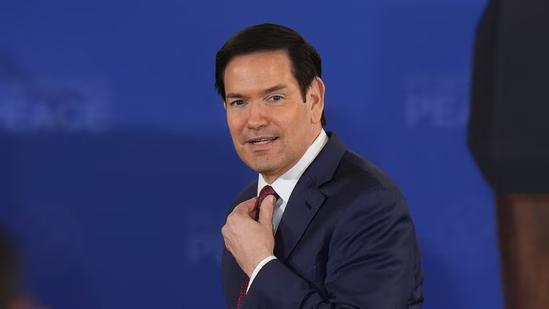
We Keep an Eye on India & Pak Situation Every Single Day: US
The ongoing tensions between India and Pakistan have been a cause of concern for the international community. The recent statements made by US Secretary of State Marco Rubio have added fuel to the fire, as he claimed that the US “keeps an eye” on the situation between the two countries “every single day”.
In an interview, Rubio emphasized that the US is closely monitoring the situation and is working towards a peace deal between the two nations. He stated, “What we’re aiming for is not some permanent ceasefire. What we’re aiming for here is a peace deal.”
Rubio’s comments come at a time when the situation between India and Pakistan is at a boiling point. Tensions have been escalating over the past few months, with both countries exchanging fire across the Line of Control (LoC) and engaging in a war of words. The situation has reached a critical point, with both countries accusing each other of violating ceasefire agreements.
The recent ceasefire violations have resulted in the loss of innocent lives, including civilians and soldiers. The international community has been urging both countries to exercise restraint and engage in dialogue to resolve their differences peacefully.
Rubio’s statement suggests that the US is taking a proactive approach to address the situation between India and Pakistan. The US has historically been a key player in regional affairs, and its involvement can be instrumental in bringing the two countries to the negotiating table.
However, Rubio’s comments also highlight the challenges that lie ahead. He emphasized that ceasefires “can fall apart very quickly”, implying that a permanent solution requires more than just a ceasefire. This underscores the need for a comprehensive and durable peace deal that addresses the root causes of the conflict.
The US has a long history of involvement in the region, dating back to the Cold War era. During that time, the US played a key role in shaping the regional balance of power, supporting friendly regimes and countering the influence of rival powers such as the Soviet Union.
In recent years, the US has continued to play a significant role in regional affairs, particularly in the context of the war against terrorism. The US has worked closely with India and Pakistan to combat terrorist groups operating in the region, including the Taliban and Al-Qaeda.
The US has also been involved in efforts to promote dialogue and reconciliation between India and Pakistan. In 2019, US Secretary of State Mike Pompeo visited India and Pakistan, where he met with the leaders of both countries and urged them to engage in dialogue to resolve their differences peacefully.
Rubio’s statement suggests that the US is committed to continuing this effort. He emphasized that the US is “aiming for a peace deal” between India and Pakistan, rather than just a ceasefire. This implies that the US is willing to invest diplomatic capital to bring the two countries together and facilitate a lasting peace agreement.
However, achieving a peace deal between India and Pakistan will require significant efforts and compromises from both sides. The two countries have a long history of conflict and mistrust, and their differences are deeply ingrained.
India and Pakistan have fought three wars over the past seven decades, and their relationship has been marked by periods of tension and violence. The two countries have also had a difficult relationship with each other, with India accusing Pakistan of supporting terrorist groups and Pakistan accusing India of human rights abuses in Kashmir.
Despite these challenges, there are reasons to be optimistic about the prospects for peace between India and Pakistan. Both countries have shown a willingness to engage in dialogue in the past, and they have made progress on issues such as trade and people-to-people exchanges.
The US can play an important role in facilitating dialogue and reconciliation between India and Pakistan. By providing diplomatic support and urging both sides to engage in constructive dialogue, the US can help create an environment that is conducive to peace and stability.
In conclusion, Rubio’s statement highlights the importance of monitoring the situation between India and Pakistan. The US has a vested interest in promoting peace and stability in the region, and it is committed to working towards a lasting peace agreement between the two countries.
The challenges ahead will be significant, but there are reasons to be optimistic about the prospects for peace. By continuing to engage with both countries and providing diplomatic support, the US can help bring India and Pakistan together and facilitate a lasting peace agreement.



